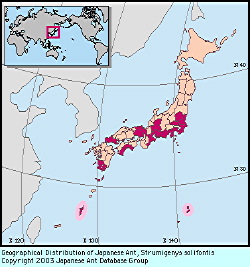
|
species
|
Strumigenys solifontis
|
 |
Japanese Name
|
Oo-uroko-ari
|
Original Reference
|
|
Brown, W.L.,Jr. (1949) Revision of the ant tribe Dacetini. 1. Fauna of Japan, China and Taiwan. Mushi 20: 1-25.
|
Description
|
|
Total length of workers around 2.5 - 3 mm. Body color yellowish brown to brown. Similar to S. lewisi, but distinguished by the following characters: head proportionally longer and less convex in profile; mandibles relatively long, with elongate subapical teeth; antennal scapes and funiculi relatively long; mesosoma more slender; dorsal outline of mesosoma from pronotum to base of propodeal spine rather concave; infradental lamellae of propodeum quite strongly concave.
|
Remarks
|
|
The females of this species have large eyes and a relatively raised mesonotum. Nests are found under stones or in cavities of stones in woodland margins (Masuko, 1980). Colonies are usually polygynous comprising over 200 workers (Masuko, 1980). Rather rare in Honshu, but common on Okinawa Island.
|
|

Distribution
|
|
Honshu (Kanto District and southwards), Shikoku, Kyushu, Nansei Is (Okinawa I.), Ogasawara Is; Taiwan.
|
|
References
|
|
- Masuko, K. (1980). Ecology of Strumigenys solifontis Brown at Mt. Kiyosumi. . Kiyosumi, (8), 5-17. .
|
Editor
|
|
Original text by Kazuo Ogata, Keiichi Onoyama and Mamoru Terayama. English translation by Kazuo Ogata, edited by Robert W. Taylor.?@Revised by Masashi Yoshimura.
|
|